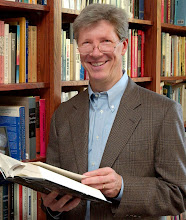But not Walter Hüssy, the grown son of the local factory owners who had financially paid for the bulk of the church building’s construction a few years earlier. He penned an open letter to Barth, published in the town newspaper: “Barth’s agitating speech was an attempt to sow discord between employers and employees. The owners after all are those who pull the cart, and need some elbow room.”
Barth replied, in the same newspaper: “My honored sir, may I loan or give you a few good books where you can teach yourself some things? You address me in my role as pastor, that I should have a mediating effect. That would suit you! With your permission however, as pastor I set myself a different program, over which I owe no accounting to you. You may be older than I, but nonetheless you are still young enough to develop better insights. I sincerely wish you that.”
The following Sunday, the church was packed beyond capacity! The slugfest was all the talk of Safenwil. The paper published an anonymous column entitled “The Red Danger in Safenwil,” noting Barth’s subversive agitation, and stating uncertainty whether he was really a good Christian or not. The Hüssys promptly departed the church – with their large donations.
His professor of theology in Basel, Paul Wernle, corresponded with him, leading him to rethink not the content but the tone of his remarks. Wernle suggested he’d answered “crudeness with crudeness and rudeness with rudeness.” Pondering this, Barth admitted “When I read Hüssy’s attack, I didn’t feel any personal offense, but a desire to fight: take up the sword of the Lord and Gideon! I didn’t intend anything but to run down an enemy of a good cause. But now, fourteen days later, as the smoke has cleared, I must acknowledge that I behaved in an Old Testament-like fashion. My gesture appears less heroic now, and I can sense all the egocentric aspects that contributed to it.”
He resolved to do better next time. On this, he never made significant progress. Preaching five years later, he asked out loud if Safenwil didn’t need a different pastor, “a pastor from whose sermons the love of God emanates with such power that you have to feel it, that you are moved. I apparently am not able to speak to you in such a way, because apparently in myself there is something very deeply not in order with God.”
I am moved by these words, and hope they were genuine. Barth, I believe, trusted so firmly in the power of the Word to effect change that, when he observed a listlessness, a lack of response in his people and the town, he looked within seeking an explanation.
Soon thereafter, he grew more acerbic: “You wish for me to be a false prophet, the pastor who pleases the people. To have a pastor in this village means to have eternal unrest in the village, a person who in the most uncomfortable way will continually question everything and give unexpected replies to all questions.”
And so, also mortified by theologians who could curtsy to the German war efforts, he wrote his Epistle to the Romans, called by theologian Karl Adam “a bomb on the playground of the theologians.” A new congregation gathered around him: countless young theologians and pastors around the world breathing in his fresh new life. And his pastoring in a small village days were over. Should we say … thankfully?
For all of us screwing up the courage to say what we need to say, and searching for the right tone, in some little church somewhere, we want what is within us to be "in right order," and we want to speak truly - even if they do not ask or pay us to stir up eternal unrest. For me, noticing a titan like Karl Barth walked this same difficult road, is encouraging.





